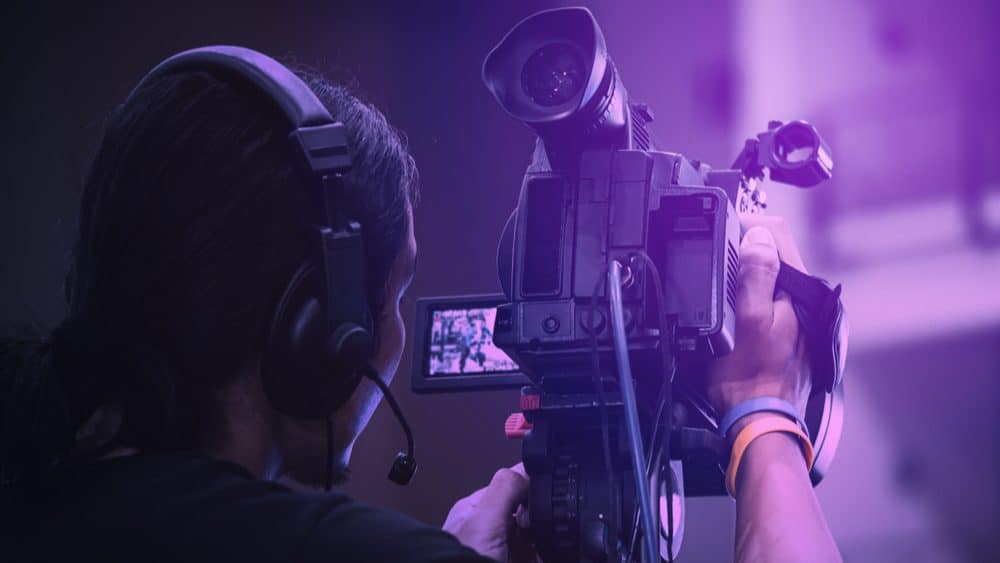
10 Different Sports Videographer Roles
Navigating the fast-paced world of sports through a lens requires more than just a steady hand and a keen eye—it’s about capturing the heart-pounding moments, the underdog stories, and, yes, even the occasional mascot shenanigans. Let’s explore the top 10 sports videographer jobs that bring the magic of the game from the field to the fans.
1. Game Day Videographer
The Game Day Videographer stands at the epicenter of live sports events, where the competition’s raw energy, the athletes’ focused intensity, and the undulating emotions of fans converge. These professionals excel in capturing high-stakes moments under varied lighting conditions and from dynamic angles. They require a profound understanding of videography and an intimate knowledge of the sport itself, allowing them to anticipate play developments and be at the right place at the right time.
Key Skills
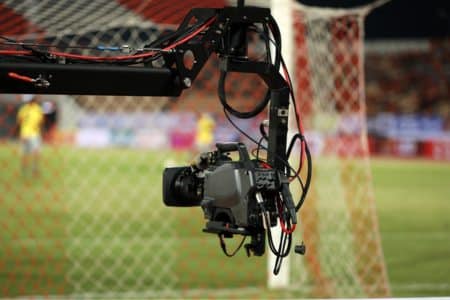
- Anticipation and Instinct: Mastery in predicting gameplay and capturing spontaneous moments that define the event.
- Agility and Endurance: Navigating the field and maintaining focus during lengthy matches, all while managing heavy and sophisticated equipment.
- Technical Expertise: Proficient in the use of professional-grade video cameras, understanding frame rates, exposure, and focus to deliver high-quality footage. The Sony PXW-FS7, for example, is favored for its ergonomics and exceptional slow-motion capture, enabling videographers to isolate moments of triumph or defeat in stunning detail.
- Composition and Storytelling: Crafting visually compelling shots that tell the story of the game, highlighting not just the action but the emotion and atmosphere of the sporting event.
Before the game starts, the videographer surveys the venue to plan shot compositions and identify potential key locations for capturing pivotal moments. As the game unfolds, they adapt to the unpredictable nature of live sports, capturing footage that ranges from wide-angle shots of the entire field to tight close-ups of players’ expressions and intricate play details. Whether positioning themselves behind the goal to catch the decisive moment of a penalty kick or tracking the emotional reactions of the bench and audience, their work is pivotal in bringing the full spectrum of the game-day experience to viewers.
2. Sports Documentary Filmmaker
The Sports Documentary Filmmaker weaves the rich tapestry of sports culture, history, and personal triumph into compelling visual narratives. Equipped with a keen sense of narrative, a deep appreciation for the sport’s history, and a talent for uncovering the underlying stories that often go unnoticed, these filmmakers bring to life the struggles, victories, and transformative journeys of athletes and teams.
Key Skills
- Research and Development: The foundation of a compelling documentary is thorough research and a strong narrative structure. Filmmakers spend extensive time gathering information, understanding historical contexts, and identifying key themes that will resonate with audiences.
- Technical Proficiency: Skilled in using various cameras, from DSLRs to cinema-grade equipment like the Canon C300 Mark II, known for its ability to produce film-quality footage even in challenging lighting conditions, complemented by a deep understanding of editing software to weave together footage, interviews, and archival material into a cohesive story.
- Empathy and Sensitivity: You must be able to build trust with subjects and treat their stories with the respect and sensitivity they deserve. This emotional intelligence is crucial in capturing the authentic essence of the subjects’ experiences.
The process begins long before the camera starts rolling, with filmmakers immersing themselves in the subject matter, be it a legendary athlete’s career, a historical sports event, or the impact of sports on a community. They might spend days with the subjects, attending training sessions, or exploring their personal archives. During filming, they capture not only the interviews but also the environment, training sessions, and personal moments that add depth to the story. Post-production involves meticulous editing, ensuring the final documentary tells a compelling, coherent, and visually stunning story that captivates and moves audiences.
3. Team Videographer
The Team Videographer is the visual chronicler of a sports team’s journey, capturing not just the highs and lows of competition but the quieter moments of dedication, camaraderie, and the daily grind. These videographers have unparalleled access to behind-the-scenes activities since they’re embedded with the team, from the tension-filled locker rooms before a match to the rigorous training sessions that shape champions. Their footage serves multiple purposes: it can be a tool for coaches to analyze technique and strategy, a means to engage fans with insider content, or even a way to preserve the team’s legacy over a season.
Key Skills
- Discretion and Access: Being embedded with a team means earning the trust of players and staff alike, navigating the balance between capturing intimate moments and respecting privacy.
- Versatility: Proficient in a range of filming techniques, from handheld cameras for up-close action shots to drones for aerial footage of training sessions. Familiarity with various cameras, such as the versatile Panasonic Lumix GH5, is essential for its ability to capture high-quality video in different settings.
- Editing and Production: Beyond filming, the Team Videographer is often responsible for editing content into various formats, from detailed analysis videos for the coaching staff to engaging clips for social media.
A typical day could start with capturing sunrise training sessions, focusing on the athletes’ techniques, the coaches’ instructions, and the overall team dynamics. Throughout the day, the videographer might switch between filming interviews with players, documenting rehabilitation sessions with injured athletes, and gathering atmospheric shots that highlight the team’s environment. The goal is to craft stories that resonate with viewers, whether they’re die-hard fans or new supporters, by providing an authentic glimpse into the team’s world.
4. Drone Videographer for Outdoor Sports
Drone Videographers take to the skies to capture breathtaking vistas and heart-stopping action from above. This sports videographer job combines the thrill of sports with the cutting-edge capabilities of drone technology, offering a bird’s eye view that adds depth and drama to the portrayal of outdoor sports like mountain biking, skiing, and surfing. The unique perspective provided by drones elevates the storytelling potential, showcasing the scale of the environment and the athlete’s interaction with it in stunning clarity.
Key Skills
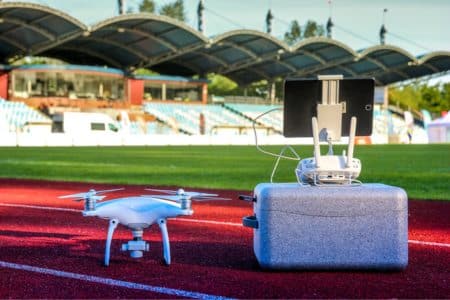
- Piloting Expertise: Proficient in maneuvering drones through challenging landscapes, ensuring stable, clear footage while navigating around obstacles and weather conditions. Skills in using advanced drones, such as the DJI Mavic Pro 2, known for its high-resolution camera and agility, are paramount.
- Visual Storytelling: Ability to visualize and execute shots that enhance the narrative, capturing the sport’s essence and the athletes’ spirit with dynamic aerial cinematography.
- Safety and Compliance: Knowledge of aviation regulations and safety protocols to conduct flights responsibly, especially in crowded or sensitive natural environments.
- Technical Proficiency: Understanding of the technical aspects of drone cameras, including exposure, frame rate, and composition, to produce high-quality footage that requires minimal post-production adjustment.
A day’s work might begin with a pre-dawn setup to catch the golden hour light as a surfer tackles the morning waves or a mountain biker conquers a rugged trail. The Drone Videographer plans each flight meticulously, considering angles, altitude, and the day’s conditions to capture the action. Whether it’s soaring above a climber ascending a sheer cliff face or following a skier through powdery slopes, each shot is planned to highlight the synergy between athlete and environment.
5. 360-Degree Sports Videographer
The 360-degree Sports Videographer harnesses the power of 360-degree video technology to create engaging, immersive experiences, allowing viewers to explore every angle of the game on their own terms. From the center of a huddle to the middle of a penalty shootout, this videographer captures the full spectrum of the event, ensuring fans miss none of the action. Mastery of 360-degree camera technology, a creative mindset to envision the immersive experience and a deep understanding of what makes each sport captivating are crucial for success in this role.
Key Skills
- Technological Savvy: Proficient in the latest 360-degree camera technology, such as the GoPro Max or the Insta360 One X, known for their high-resolution output and robust stabilization features. Understanding how to stitch footage seamlessly to create a cohesive, immersive experience is essential.
- Spatial Awareness: Ability to conceptualize and capture scenes in a way that fully utilizes the 360-degree format, encouraging viewers to explore and interact with the content.
- Interactive Storytelling: Crafting stories that engage viewers actively, requiring them to look around and discover content within the video frame, creating a unique, personal experience for each viewer.
- Post-Production Expertise: Skilled in editing software designed for 360-degree content, capable of stitching, correcting, and enhancing footage to ensure a smooth and immersive viewing experience.
The 360-degree Sports Videographer plans their shoot with the viewer’s perspective in mind, placing cameras in locations that maximize the immersive potential—whether it’s on the sidelines of a football game, above a basketball hoop, or inside a racing car. The aim is to capture not just the event but the atmosphere, inviting viewers to feel the crowd’s energy and the competition’s intensity. After filming, the videographer meticulously stitches the footage together, ensuring a seamless experience that transports viewers right into the middle of the action.
6. Underwater Sports Videographer
The Underwater Sports Videographer dives deep into the aquatic realm to capture the grace and agility of athletes in sports like swimming, diving, synchronized swimming, and water polo. This specialized sports videographer job combines the art of videography with the technical challenge of underwater filming, requiring a unique blend of skills to produce clear, compelling footage beneath the surface. Mastery over underwater camera housings, underwater lighting techniques, and breath control is as crucial as understanding the sport being captured.
Key Skills
- Aquatic Proficiency: Strong swimming skills and comfort in the water are essential, with scuba certification often required for deeper or longer underwater sessions.
- Technical Expertise: Proficient in using underwater camera equipment, such as the Sony RX100 series with dedicated underwater housing, known for its high-quality image capture in challenging lighting conditions.
- Visual Composition: An eye for composition that leverages the unique underwater perspective, capturing the fluid motion of athletes and the interplay of light and water.
An Underwater Sports Videographer’s day might start with setting up underwater lighting to enhance visibility and highlight the athletes’ movements. Positioning is key; they might hover near the bottom of the pool during a race to capture the powerful strokes of swimmers or float quietly above a synchronized swimming routine to get the full artistic effect. The challenge is maintaining a steady shot while swimming and adjusting camera settings manually through the housing to adapt to underwater sports’ dynamic light and motion. Post-production involves correcting color balance and clarity, often lost at depth, to bring the vibrant life of the footage to the surface.
7. Wearable Camera Specialist for Extreme Sports
The Wearable Camera Specialist for Extreme Sports focuses on equipping athletes participating in sports like skydiving, mountain biking, skateboarding, and snowboarding with wearable cameras, capturing exhilarating first-person perspectives that transport viewers into the heart of the action. This sports videographer job requires a deep understanding of camera technology and mounting techniques, an adventurous spirit, and a creative eye to envision the shots that will best convey the thrill of the sport.
Key Skills
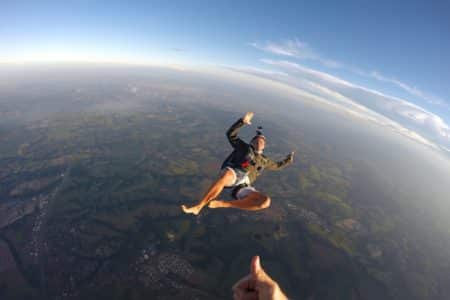
- Technical Proficiency with Wearable Cameras: Expertise in the latest wearable camera technology, such as the GoPro Hero series or Garmin VIRB, known for their durability, high-quality image stabilization, and ability to capture high-resolution footage in extreme conditions.
- Mounting and Rigging Innovation: Inventive approaches to camera mounting, ensuring secure attachment that withstands the rigors of extreme sports while also optimizing the camera angle for the most dynamic and immersive footage.
- Action Sports Understanding: A deep appreciation and knowledge of extreme sports to anticipate key moments and movements, ensuring the wearable cameras capture the essence of the experience.
- Editing for Impact: Skills in editing software to turn raw footage into compelling narratives, highlight the most breathtaking moments, and create a visceral viewing experience.
The day begins with prepping the athletes, securely attaching cameras to helmets, chest harnesses, or custom rigs designed for specific activities, like mounting on a skateboard or the wing of a base jumping suit. The Specialist works closely with athletes to discuss the desired outcomes, offering advice on maximizing the footage’s impact by considering light, angle, and movement. Throughout the event, they monitor equipment performance remotely, making adjustments to ensure optimal recording. Post-event, the focus shifts to editing, where the Specialist selects the most impactful footage, enhancing the visual experience with tight cuts, slow-motion effects, and sound design that underscores the intensity of the action.
8. Action Sports Videographer
The Action Sports Videographer captures the fast-paced, dynamic world of action sports, from skateboarding and BMX to snowboarding and surfing. This sports videographer job demands a blend of creative vision, technical skill, and an adventurous spirit that matches the athletes themselves. Action Sports Videographers must navigate varied and often unpredictable environments, from city skate parks to remote mountain slopes, to create footage that conveys these sports’ intensity, skill, and culture.
Key Skills
- Mobility and Agility: Ability to move quickly and adapt to the changing landscapes of action sports, capturing dynamic shots that match the athletes’ energy.
- Technical Camera Skills: Proficiency with a range of cameras, from DSLRs to action cams like the GoPro Hero series, known for its portability and robust performance in extreme conditions. Understanding how to manipulate camera settings for fast-moving subjects and varied lighting is key.
- Creative Composition: An eye for framing shots that tell a story, whether it’s a close-up of a skateboarder’s feet as they launch off a ramp or a wide shot that captures the scale of a mountain biking trail.
- Editing for Excitement: The ability to edit footage into a compelling narrative that captures the essence of the sport and the personalities of the athletes, often incorporating music, slow-motion, and creative transitions to enhance the viewing experience.
A day in the life of an Action Sports Videographer might involve setting up at a skate park before dawn to catch the best light and the athletes’ practice runs. They’ll work closely with athletes, planning shots that showcase their skills and style. Throughout the day, the videographer is in constant motion, switching between cameras and lenses to capture the action from multiple angles, always looking for the next creative shot that will bring the audience into the heart of the sport. The day doesn’t end when the filming stops; hours are spent in post-production, selecting the best footage, and crafting a story that resonates with fans and reflects the spirit of action sports.
9. Sports News Videographer
The Sports News Videographer is the frontline storyteller for the sports segment of news media, capturing the immediate aftermath of games, the intensity of athlete interviews, and the buzzing atmosphere of press conferences. This sports videographer job requires a swift, efficient approach to videography, as timeliness is often critical to capturing the essence of breaking sports news. These videographers navigate stadiums, training grounds, and press rooms, equipped with a keen sense for newsworthy content, ensuring that viewers receive up-to-the-minute, compelling visual stories that complement sports journalism.
Key Skills
- Quick Reflexes and Decision-Making: Ability to quickly set up shots, adjust to changing scenarios, and capture key moments, often under the pressure of deadlines.
- Broad Technical Knowledge: Proficiency with professional-grade video cameras and audio equipment, such as the Canon XF705, for its fast autofocus and excellent image quality in a range of lighting conditions, ensuring clear, broadcast-quality footage.
- Editing and Delivery Under Pressure: Fast-paced editing skills to trim, package, and transmit footage back to the newsroom in time for broadcasts, often working from mobile editing stations or vans.
On game day, a Sports News Videographer might begin by capturing pre-game warm-ups and fan arrivals, offering a preamble to the excitement. As the game concludes, they position themselves to catch the immediate reactions of players and coaches, sprinting to the sidelines or locker rooms to secure exclusive post-game comments. The work is dynamic and fast-paced; they might find themselves editing footage on a laptop in the back of a media room, ready to send the first clips of a winning goal or a controversial referee decision back to the newsroom for immediate release.
10. Freelance Sports Videographer
The Freelance Sports Videographer is a versatile, independent professional who brings the world of sports to life across various platforms and clients. From local youth tournaments to high-profile professional matches, their work spans the spectrum of sports, offering a unique blend of creative freedom and the challenge of adapting to different project requirements. Freelancers must be adept at capturing compelling sports footage and skilled in marketing their services, managing client relationships, and navigating the logistical challenges of varied shooting locations and schedules. This sports videographer job offers the opportunity to work on diverse projects, including team promotional videos, athlete highlight reels, and sports documentaries, requiring a broad skill set and a proactive approach to sourcing work.
Key Skills
- Versatility and Adaptability: Capable of shooting a wide range of sports, understanding the unique requirements and pacing of each, and adjusting filming techniques accordingly.
- Business Acumen: Skills in self-promotion, negotiating contracts, and maintaining positive client relationships are crucial for securing and successfully completing projects.
- Technical Mastery: Proficiency with various camera equipment and editing software, able to produce high-quality content tailored to each client’s specific needs. Knowledge of cameras like the Sony A7 series, favored for their versatility and excellent performance in various lighting conditions, is essential.
- Creative Storytelling: Ability to craft engaging narratives through sports footage, whether it’s capturing the intensity of a match or the personal journey of an athlete, appealing to the target audience of each project.
A Freelance Sports Videographer’s day might start with filming a local soccer game, utilizing dynamic camera movements to capture the action and emotion of the match. The next project could involve interviewing a rising star in the tennis world, requiring a different set of skills to produce a compelling feature piece. Each project demands careful planning, from scouting locations and setting up shots to post-production work that brings the story to life. Freelancers often juggle multiple projects simultaneously, managing their schedules to meet deadlines and client expectations.
Carving Your Niche in Sports Videography
Success in the competitive arena of sports videography isn’t solely the result of mastering the camera. It’s about combining technical prowess with a nuanced understanding of the sports landscape and forging a reputation that sets you apart. Here’s how to make your mark:
Building Expertise and Reputation
Securing sports videographer jobs hinges on continuously expanding your skill set and showcasing your unique expertise and reputation in the sports world.
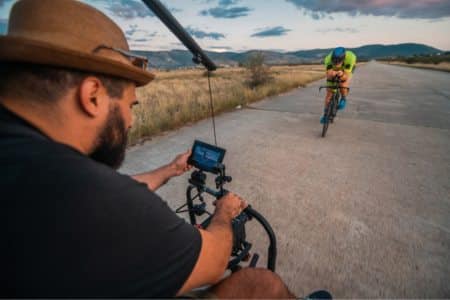
- Continuous Education: The sports world is ever-evolving, with new techniques, strategies, and stars emerging constantly. Stay informed by following industry news, attending workshops, and even taking online courses focusing on videography and sports dynamics.
- Specialization: While a broad skill set is beneficial, specializing in a niche—be it a specific sport, type of content (like documentaries or highlight reels), or technology (such as drone or 360-degree videography)—can make you the go-to expert in that area.
- Portfolio Development: Your portfolio is your calling card. Regularly update it with your best work, showcasing a range of skills and projects. Include behind-the-scenes content to give potential clients insight into your process and dedication.
- Feedback and Improvement: Seek constructive criticism from peers and mentors and use it to refine your style and approach. Your portfolio can showcase your growth and adaptability and enhance your reputation in the industry.
Embracing Technological Advances
When it comes to sports videographer jobs, embracing technological advances not only sets you apart but also opens up new avenues for creative storytelling and audience engagement.
- Innovative Equipment: Stay abreast of the latest camera, lighting, and editing technology. Being proficient with cutting-edge equipment like high-frame-rate cameras for slow-motion capture or harnessing the capabilities of the latest drones can set your work apart.
- Virtual Reality and Augmented Reality: These technologies are creating immersive experiences that offer viewers unprecedented involvement in sports events. Developing skills in VR and AR storytelling can position you at the forefront of sports videography innovation.
The Power of Networking
Effective networking is a cornerstone for success in sports videographer jobs, enabling you to build relationships that could lead to your next big project or collaboration.
- Industry Events: Attend sports events, film festivals, and conferences to meet other professionals in the field. These interactions can lead to collaborative projects, insights into emerging trends, and job opportunities.
- Online Communities: Participate in forums and social media groups dedicated to sports videography and photography. Sharing your knowledge and experiences can help build your reputation as a knowledgeable and approachable professional.
- Professional Organizations: Joining organizations like the International Sports Press Association (AIPS) or local sports media groups can offer exclusive resources, sports media job listings, and networking opportunities.
By focusing on these areas, aspiring and established sports videographers alike can carve out their niche, build a reputable brand, and stay ahead in the fast-paced and ever-changing field of sports videography. The key to success lies in combining your passion for sports with a commitment to continuous learning and innovation.
Where To Find Sports Videographer Jobs
As you gear up to take the next steps towards one of these sports videographer jobs, consider leveraging resources designed to propel professionals like you forward in the sports industry. Jobs In Sports offers a variety of tools and opportunities to help you along the way:
- Explore Free Memberships: Get started with a free membership, granting you access to a job seeker profile, invitations to apply, and resume postings that can help launch or elevate your career in sports videography.
- Upgrade to a Paid Membership: For those ready to dive deeper, our paid memberships provide comprehensive access to detailed job listings, a sports job database, and possible recommendations.
- Browse Sports Job Listings: Don’t miss out on the chance to find your dream job. Check out our current sports job listings specifically curated for dynamic roles in sports videography and beyond. Whether you’re just starting out or looking to make a significant career move, these listings are a valuable resource in your job search.
Starting one of these sports videographer jobs is not just about capturing the game; it’s about telling the story behind every play, every victory, and every loss.





